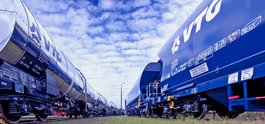More than 1,250 freight tons – or 4,500 m3 – split between more than 100 truck loads and 40 special transports: Between July and September 2017, VTG Rail Logistics’ Project Solutions department delivered parts to Eastern Europe for the construction of two major plants. A global leading gas and engineering company and long-standing VTG customer is currently supplying parts for a refinery in Afipsky in the southwest Russian region of Krasnodar, as well as for an air separation plant in Grodno, Belarus. The project logistics team at VTG planned and successfully completed the transports needed to supply both building sites. “We are very pleased that these challenging transports were once again able to demonstrate our expertise,” says Klaus Lutze, head of VTG Project Solutions.
Afipsky: Spot-on delivery by sea and road
Between July and August 2017, the experts at VTG Project Solutions successfully transported a total of 925 tons of freight for the Afipsky petrochemical project to Novorossiysk in the Russian region of Krasnodar. VTG was responsible for organizing and implementing preliminary transport by special road vehicles and barges from suppliers in southern and western Germany to Antwerp. The company also took charge of subsequent ocean-going shipment from the Belgian port to Novorissiysk, stopping off in Italy on the way to pick up 40-meter-long columns with a diameter of 4.5 meters. “The entire load had to be packed on the vessel with sub-centimeter accuracy. Another major challenge was the tight deadline pressure: To ensure that transshipment and onward transport in Novorossiysk ran smoothly, we needed to get our delivery spot on. And we did!” Lutze says.
Grodno: Standard and special transports
A new air separation plant is currently being constructed in Grodno, on the western edge of Belarus. To supply the building site with the materials it needed, VTG Rail Logistics dispatched around 100 standard truck loads to the destination between July and September 2017, as well as 25 special transports from Germany, the Netherlands, Italy and South Korea. Not only that, it also made sure that the plant’s four core units safely reached their destination. The cold boxes, weighing up to 77 tons each and measuring 36 meters (length) by 5.5 meters (width) by 3.65 meters (height) were shipped by barge from Bavaria to Rotterdam. From here, the journey continued by ocean-going vessel to Klaipėda in Lithuania, where a 650-kilometer road journey remained. “We also organized storage of the parts for about three months to avoid any delays at the building site,” Lutze adds.
About VTG Project Solutions
A team of around 30 people based in Berlin, Chemnitz and Bad Homburg organize major transportation projects by rail, road and sea/inland waterways. Their job is to plan routes exactly, including the production of route studies to take account of any hindrances with regard to size or weight, and to organize and complete transportation. One focus is on transports to and from the states of the former CIS and to China. Another is on projects for customers in the petrochemicals and plant engineering sectors.
About VTG Rail Logistics
VTG Rail Logistics specializes in the pan-European rail transportation of liquid, agricultural and industrial goods via private and state-owned rail carriers. The planning and execution of each and every shipment – by single wagon, blocktrain or as a wagon pool solution – is tailored perfectly to the needs of the individual customer. VTG Rail Logistics handles every aspect of fleet management, from capacity checks to fleet monitoring and administration to maintenance and repair work, for the 5,500 rented wagons in its care. It also organizes upstream and downstream transportation by sea and road and provides access to the rail network for companies with no sidings of their own.



